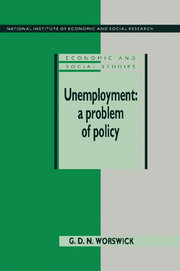Book contents
- Frontmatter
- Contents
- List of tables
- List of charts
- Preface
- 1 INTRODUCTION
- 2 CONCEPTS AND MEASUREMENTS
- PART 1 STRUCTURAL CHANGE
- PART 2 THE WAGE QUESTION
- PART 3 MACROECONOMIC POLICY
- 12 THE THEORETICAL BACKGROUND
- 13 EVIDENCE RELATING TO THE ECONOMY
- 14 EVIDENCE RELATING TO POLICY
- 15 REFLECTIONS ON MACROECONOMIC POLICY
- PART 4 INTERNATIONAL DIMENSION
- Appendix to Chapter 8: The puzzle of the apparent fall in United States real wages
- Notes
- List of works cited
- Index
- THE NATIONAL INSTITUTE OF ECONOMIC AND SOCIAL RESEARCH PUBLICATIONS IN PRINT
12 - THE THEORETICAL BACKGROUND
from PART 3 - MACROECONOMIC POLICY
Published online by Cambridge University Press: 06 July 2010
- Frontmatter
- Contents
- List of tables
- List of charts
- Preface
- 1 INTRODUCTION
- 2 CONCEPTS AND MEASUREMENTS
- PART 1 STRUCTURAL CHANGE
- PART 2 THE WAGE QUESTION
- PART 3 MACROECONOMIC POLICY
- 12 THE THEORETICAL BACKGROUND
- 13 EVIDENCE RELATING TO THE ECONOMY
- 14 EVIDENCE RELATING TO POLICY
- 15 REFLECTIONS ON MACROECONOMIC POLICY
- PART 4 INTERNATIONAL DIMENSION
- Appendix to Chapter 8: The puzzle of the apparent fall in United States real wages
- Notes
- List of works cited
- Index
- THE NATIONAL INSTITUTE OF ECONOMIC AND SOCIAL RESEARCH PUBLICATIONS IN PRINT
Summary
INTRODUCTION
In this part of the book we consider whether the prospects for employment can be improved by macroeconomic policy. We mean by that expression: fiscal policy; monetary policy; and incomes policy. The term is a clumsy one, and since we have already considered incomes policy in Part 2, as an aspect of the Wage Question, it was tempting to use the expression demand management. However, this term normally excludes incomes policy, which we wish to consider as an adjunct to the other two.
Whether there is scope for macroeconomic policy to influence the level of employment depends on one's view about how a predominantly private enterprise economy would behave if left to itself. There are many views about this, but among them one can pick out two dominant strands – classical and Keynesian. According to the former, if the economy has been subjected to a shock, which has caused unemployment, there are forces within the economy which will bring it back automatically towards full employment. According to the latter view, these forces may not always work in the prescribed manner, leaving the economy stuck with persistent unemployment.
The classical position has the longer pedigree. In Britain until the 1930s it was the dominant view, an application of mainstream economic theory. Then, during the Second World War, and for a quarter of a century after, it was no longer to be seen.
- Type
- Chapter
- Information
- Unemployment: A Problem of PolicyAnalysis of British Experience and Prospects, pp. 131 - 143Publisher: Cambridge University PressPrint publication year: 1991

